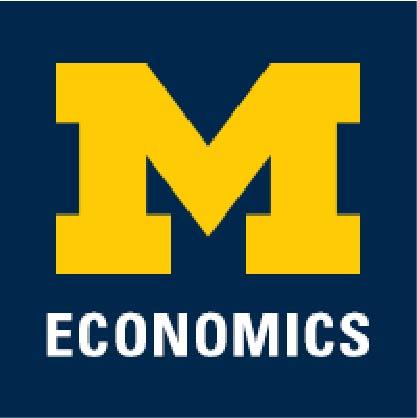International Day Conference
Federico Huneeus (Duke), Enghin Atalay (Federal Reserve Bank of Philadelphia), Xiang Ding (Georgetown)
Please join us for the one-day conference hosted by Michigan International Economics on Friday, November 14 at the Lorch Hall in room 201. RSVP is not required.
The conference program is below:
10:00 – 11:00 AM Federico Huneeus (Duke) "Production Network Formation, Trade, and Welfare"
Abstract: We study the aggregate implications of production network formation in a quantitative multi-location general equilibrium trade model. Firms search for suppliers and buyers across locations subject to matching frictions, generating a gravity structure of production networks. We develop sufficient statistics for global and regional welfare and characterize the deviations from the fixed network environment, including the role of inefficiency and amplification effects of search and matching. We calibrate our multi-sector model to Chilean domestic and international firm-to-firm trade data and show that our model can rationalize the observed increase in domestic supplier linkages after Chile’s recent trade agreements. Abstracting from endogenous networks reduces Chile’s aggregate welfare losses by 20 percent when import costs are raised to their pre-agreement levels, consistent with inefficiently low equilibrium levels of search. Fixing the trade elasticity, the welfare gains from trade relative to municipality autarky drop by 40 percent due to amplification effects of search.
11:00 – 11:30 AM Coffee Break
11:30 – 12:30 PM Enghin Atalay (Philadelphia Fed) "Micro- and Macroeconomic Impacts of a Place-Based Industrial Policy"
Abstract: We evaluate a set of place-based subsidies introduced in Turkey in 2012. Using firmlevel balance-sheet data along with data on the domestic production network, we first assess the policy’s direct and indirect impacts. We identify increased economic activity in industry-province pairs targeted by the subsidies, with positive spillovers to firms’ customers and suppliers. Using a dynamic multi-region multi-industry general equilibrium model, we assess the program’s aggregate impacts. According to the calibrated model, the subsidy program reduces inequality between the relatively underdeveloped and more prosperous portions of the country. However, trade, migration, and investment spillovers blunt the policy’s impact on regional inequality.
1:30 – 2:30 PM Xiang Ding (Georgetown) "The Costs of Market Disintegration: Evidence from the India-Pakistan Border"
Abstract: This paper constructs the first global dataset on inter-sectoral capital service flows. I use this data to disaggregate capital services and intermediate inputs in a dynamic multi-sector model of global production. Steady state allocations and responses to shocks are determined by a capital-augmented global input-output matrix. Two properties of the capital services network deliver larger long-run consumption impacts of globalization than existing estimates, and larger impacts in more capital-intensive countries. First, more consumption-influential producers use capital from more trade-exposed suppliers. Second, heterogeneity in the network reallocates sectoral expenditures towards producers with the largest respective declines in capital service costs. These reallocations raise capital incomes for producers and lower price indices for consumers.
The conference program is below:
10:00 – 11:00 AM Federico Huneeus (Duke) "Production Network Formation, Trade, and Welfare"
Abstract: We study the aggregate implications of production network formation in a quantitative multi-location general equilibrium trade model. Firms search for suppliers and buyers across locations subject to matching frictions, generating a gravity structure of production networks. We develop sufficient statistics for global and regional welfare and characterize the deviations from the fixed network environment, including the role of inefficiency and amplification effects of search and matching. We calibrate our multi-sector model to Chilean domestic and international firm-to-firm trade data and show that our model can rationalize the observed increase in domestic supplier linkages after Chile’s recent trade agreements. Abstracting from endogenous networks reduces Chile’s aggregate welfare losses by 20 percent when import costs are raised to their pre-agreement levels, consistent with inefficiently low equilibrium levels of search. Fixing the trade elasticity, the welfare gains from trade relative to municipality autarky drop by 40 percent due to amplification effects of search.
11:00 – 11:30 AM Coffee Break
11:30 – 12:30 PM Enghin Atalay (Philadelphia Fed) "Micro- and Macroeconomic Impacts of a Place-Based Industrial Policy"
Abstract: We evaluate a set of place-based subsidies introduced in Turkey in 2012. Using firmlevel balance-sheet data along with data on the domestic production network, we first assess the policy’s direct and indirect impacts. We identify increased economic activity in industry-province pairs targeted by the subsidies, with positive spillovers to firms’ customers and suppliers. Using a dynamic multi-region multi-industry general equilibrium model, we assess the program’s aggregate impacts. According to the calibrated model, the subsidy program reduces inequality between the relatively underdeveloped and more prosperous portions of the country. However, trade, migration, and investment spillovers blunt the policy’s impact on regional inequality.
1:30 – 2:30 PM Xiang Ding (Georgetown) "The Costs of Market Disintegration: Evidence from the India-Pakistan Border"
Abstract: This paper constructs the first global dataset on inter-sectoral capital service flows. I use this data to disaggregate capital services and intermediate inputs in a dynamic multi-sector model of global production. Steady state allocations and responses to shocks are determined by a capital-augmented global input-output matrix. Two properties of the capital services network deliver larger long-run consumption impacts of globalization than existing estimates, and larger impacts in more capital-intensive countries. First, more consumption-influential producers use capital from more trade-exposed suppliers. Second, heterogeneity in the network reallocates sectoral expenditures towards producers with the largest respective declines in capital service costs. These reallocations raise capital incomes for producers and lower price indices for consumers.
| Building: | Lorch Hall |
|---|---|
| Website: | |
| Event Type: | Conference / Symposium |
| Tags: | Economics, International, seminar |
| Source: | Happening @ Michigan from Department of Economics, International Economics, Department of Economics Seminars |


